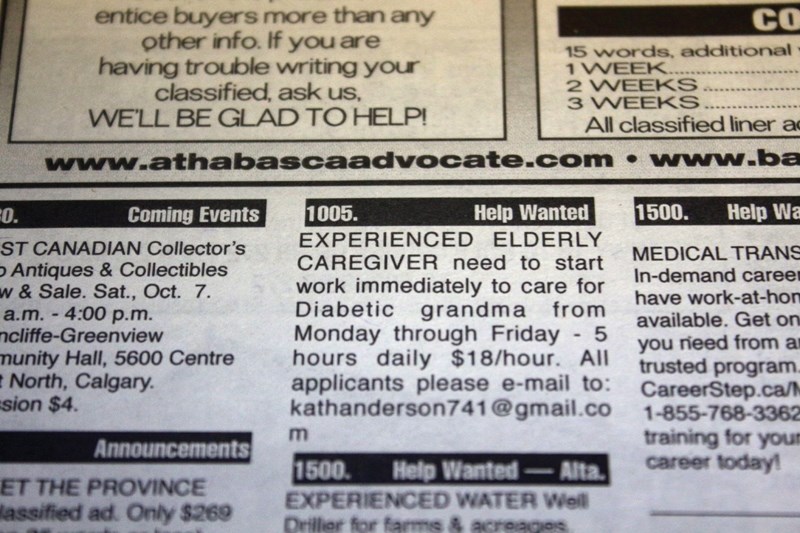An area woman is sounding the alarm after a classified ad that ran in the Sept. 19 and 26 editions of the Town & Country ended in a very strange circumstance that left her sitting with a $2,000 cheque and a lot of questions.
Elaine Hemeon responded to an advertisement for a caregiver Sept. 28 which began an exchange of e-mails with a person calling themselves Katherine Anderson. Anderson said that she was seeking a caregiver for her mother, who was undergoing treatment in Australia and would be moving back to Edmonton.
Hemeon said she was drawn to the ad because of her education in health care.
At first it seemed innocent enough. But the woman calling herself Anderson, who wrote in broken English, suddenly changed the location of her mother’s planned living space to Powell River, B.C.
Hemeon decided to decline the job offer at that point.
Then things got really weird.
On Oct. 6, Hemeon received a cheque for $2,000. That was followed by an e-mail from Anderson asking her to purchase a wheelchair in advance of her mother’s arrival. Hemeon responded she had received the cheque, but never cashed it.
“I went to the Royal Bank and shared my story,” said Hemeon. “They took the cheque and checked it out and determined it was obviously a fraud. So I just let them keep it and they’re going to alert other banks across Canada.”
Hemeon made the right move, said Ron Mycholuk of the Better Business Bureau (BBB).
He explained that Hemeon’s case is a classic example of a common scam. How it works is that the scammer sends a cheque for a large amount of money for a service or product, then when the cheque has been deposited, the scammer informs the victim they were sent too much money and asks for some of it back.
After the victim withdraws money to reimburse the scammer, the original cheque bounces.
Once they’ve managed to make a score in an area, they move to a new one and start over.
“It happens a lot with job scams, as well with online purchases,” he said, adding that the style of scam happens in a variety of forms.
“It appears in numerous variations all around the world. They either go this way, or they ask for a bunch of information to do a background check. Then they commit identity theft, which can impact credit.”
Mycholuk added that for every one person who reports a scam, there’s up to 100 people who don’t.
He says people can follow a few simple rules to protect themselves online. Never give out personal information online, insurance, credit card numbers or even contact numbers.
Never deposit, or send money to anyone unless you know and trust them.
Mycholuk noted that once money has been transferred, it can be accessed from anywhere in the world.
“There’s no check and balance,” he said. “If they have the confirmation and routing number and can prove they’re the person it’s supposed to go to, it doesn’t matter where they are.”
When the Westlock News phoned the number in the advertisement, the call went to a voicemail addressed to an Isabella Duncan, who did not respond for a request to comment.
A reverse phone search lists the number as registered in Calgary, although the advertisement was listed under a Camrose address.
Mycholuk speculated the phone number, address and name associated with the booked ad was likely unaware of their information being used this way..
“In this case, we have Westlock, Edmonton, Powell River and somewhere in Australia,” said Mycholuk. “If I’m a betting man, the person who’s targeting this is probably in none of those.”
The BBB also has a Scam Report site where people can report incidents and can be used as a tool to protect yourself online. Visit it at: https://www.bbb.org/scamtracker/us.


